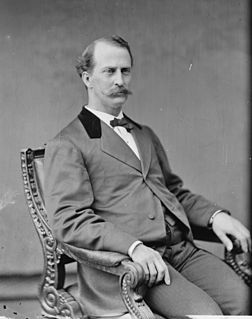A Quote by Samuel Johnson
No estimate is more in danger of erroneous calculations than those by which a man computes the force of his own genius.
Related Quotes
As eternity is longer than time, as mind is stronger than matter, as thought is swifter than the wind, as genius is more potent than gold, so will the results of well-directed labors toward the development of man's higher faculties ever outweigh a thousand fold any estimate in the currency of commerce, which man can put upon such efforts.
A genius is the man in whom you are least likely to find the power of attending to anything insipid or distasteful in itself. He breaks his engagements, leaves his letters unanswered, neglects his family duties incorrigibly, because he is powerless to turn his attention down and back from those more interesting trains of imagery with which his genius constantly occupies his mind.
Man is more than his environment. It is from the innate quality of the Spirit in him, his inner storehouse, that he draws those ideas, his intuitions, which unify his perceptions of the external world instantaneously with a value which is qualitative and not quantitative, and which he embodies in the works of his culture - those achievements which belong not only to one particular time but to all times, and mark the path of his upward progress.
When the sacredness of one's word is matched in the attributes of his character throughout, all that constitutes a man, then we find that there is something in a man's life greater than his occupation or his achievements; grander than acquisition or wealth; higher than genius; more enduring than fame.
The great characteristic of men of active genius is a sublime self-confidence, springing not from self-conceit, but from an intense identification of the man with his object, which lifts him altogether above the fear of danger and death, which gives to his enterprise a character of insanity to the common eye, and which communicates an almost superhuman audacity to his will.
A man should learn to detect and watch that gleam of light which flashes across his mind from within, more than the lustre of the firmament of bards and sages. Yet he dismisses without notice his thought, because it is his. In every work of genius we recognize our own rejected thoughts: they come back to us with a certain alienated majesty.
None of us older writers had gone through such a school. We are all self-taught. And, of course, there is always, in such a school, the danger of goose-stepping, uniformed ranks. But the Serapion Brethren have already, it seems to me, outgrown this danger. Each of them has his own individuality and his own handwriting. The common thing they have derived from the studio is the art of writing with ninety-proof ink, the art of eliminating everything that is superfluous, which is, perhaps, more difficult than writing.
What a singular destiny has been that of this remarkable man!-To be regarded in his own age as a classic, and in ours as a companion! To receive from his contemporaries that full homage which men of genius have in general received only from posterity; to be more intimately known to posterity than other men are known to their contemporaries!
At the approach of danger two voices speak with equal force in the heart of man: one very reasonably tells the man to consider the nature of the danger and the means of avoiding it and the other, even more reasonable, says that it is too painful and harassing to think of the danger... better to turn aside from the painful subject till it has come, and to think of what is pleasant. In solitude a man generally yields to the first voice; in society to the second.
Use makes a better soldier than the most urgent considerations of duty,--familiarity with danger enabling him to estimate the danger. He sees how much is the risk, and is not afflicted with imagination; knows practically Marshal Saxe's rule, that every soldier killed costs the enemy his weight in lead.
So long as men desire to live together, no man may initiate the use of physical force against others. . . . When a man attempts to deal with me by force, I answer him by force. It is only as retaliation that force may be used and only against the man who starts its use. No, I do not share his evil or sink to his concept of morality: I merely grant him his choice, destruction, the only destruction he had the right to choose: his own.
The general who wins a battle makes many calculations in his temple ere the battle is fought. The general who loses a battle makes but few calculations beforehand. Thus do many calculations lead to victory, and few calculations to defeat: how much more no calculation at all! It is by attention to this point that I can foresee who is likely to win or lose.



































